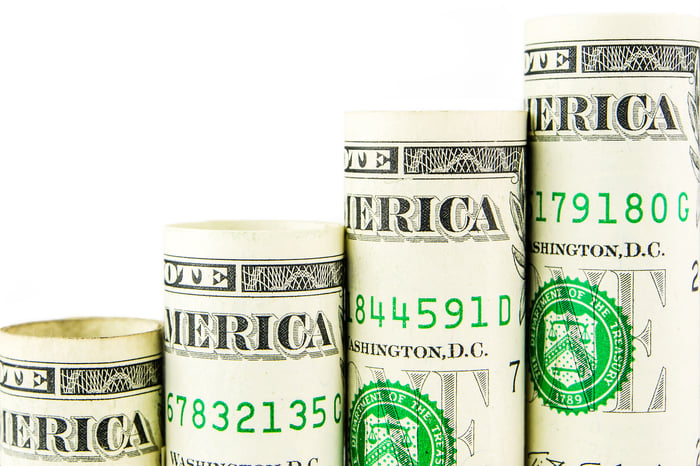Last week was another good one for healthcare stocks across the board, and a stellar week for investors holding shares of these recent high flyers.
Now that they've made some big gains, investors are right to wonder if there's more fuel in the tank. Here's what you need to know about what drove them higher.
| Company (Symbol) | Price Change During Week Ended Jun. 19, 2020 | Market Cap |
|---|---|---|
| Quidel (QDEL) | 22% | $8.8 billion |
| IDEAYA Biosciences (IDYA 3.34%) | 86% | $300 million |
| Celldex Therapeutics (CLDX 3.96%) | 72% | $521 million |
Data source: Yahoo! Finance.
1.Quidel: Inside buy
This company develops tests that can rapidly diagnose a variety of diseases including a point-of-care test for SARS-CoV-2, the virus responsible for COVID-19. Quidel's test, called the Sofia 2 SARS-CoV-2 Antigen FIA looks for pieces of the novel coronavirus floating around in the bloodstream and this gives it a leg up on the competition.

Image source: Getty Images.
Looking for pieces of the virus itself make Quidel's test significantly more accurate than tests that look for the antibodies our immune systems produce in response to SARS-CoV-2. This is because there are lots of similar antibodies directed against other coronaviruses and all antibodies stick around long after patients recover from an infection.
In May, shares of Quidel shot up after the FDA granted an emergency use authorization (EUA) to Quidel's SARS-CoV-2 test in anticipation of soaring sales. It appears that insiders are equally bullish. The stock soared on Monday in response to a regulatory filing that shows CEO Douglas Bryant, bought 5,000 shares of his own company on June 11, raising his stake in the company to 445,823 shares.
2. IDEAYA Biosciences: New targets
This company's using DNA-based testing to identify potential targets for new cancer therapies. After finding several interesting targets IDEAYA Biosciences has started developing small molecule drug candidates to that aim in their direction.
IDEAYA stock soared last week after GlaxoSmithKline (GSK -1.41%) entered a broad collaboration deal with the clinical-stage biotech. The tiny biotech's new big pharma partnership covers three potential first-in-class therapies that target MAT2A, Pol Theta, and Werner Helicase.
GlaxoSmithKline will pay IDEAYA $100 million upfront, plus another $20 million in the form of an equity stake in the tiny biotech. IDEAYA is eligible to receive half of any available profits that arise from the partnership but responsible for just 20% of global development costs.

Image source: Getty Images.
3. Celldex Therapeutics: Chronic hives
Celldex spent over a decade developing novel cancer therapies without any late-stage clinical trial successes to show for it. With this in mind, it's not surprising that the company has switched gears to immunology with CDX-1059, a potential first-in-class KIT blocker.
Although KIT has been shown to drive tumor growth, it also appears to play a role in autoimmune disorders, including chronic hives. Celldex stock roared higher last week because the company reported positive results from a 32-patient safety study with healthy volunteers.
In addition to a lack of dangerous side effects from volunteers that received CDX-1059, Celldex reported significantly reduced production of an enzyme related to hives and other immune system reactions. The company plans to begin a clinical trial with people that actually have chronic hives before the end of the year.
What's next?
We still have no idea if Celldex's experimental treatment will actually help people with chronic hives, but this didn't stop insiders, including the CEO from buying up shares of their own company.

Image source: Getty Images.
When it comes to evaluating insider trades from Quidel, Celldex, or any company, it's important to remember insiders are also people with bills to pay and vacation homes to purchase. While insiders have an endless list of innocuous reasons to sell shares, confidence in their company's future is the only reason to buy more.
At a glance, Bryant's purchase seems minor in relation to the number of shares he's already accumulated, but it probably doesn't feel like a minor purchase to him. In 2019, Bryant's total compensation worked out to around $4.2 million, but that's all tied up in stock and option awards that he appears unwilling to let go of. Bryant's actual salary was just $633,993 last year, which makes an $801,670 bet on his company's future a significant sign of confidence.
At the end of March, IDEAYA had just $90.9 million in cash after burning through $12.0 million during the first three months of 2020. The company has already taken advantage of its recently inflated stock price to raise $100 million in a secondary offering. Receiving $100 million upfront from Glaxo, and getting its new partner to pay 80% of development expenses for three early stage programs should give the company a long enough cash runway to produce some evidence its drugs work before asking for more.





